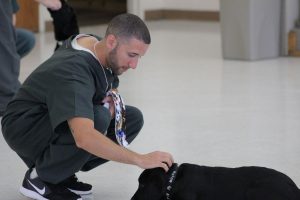
Can Do Canines, a non-profit organization that trains assistance dogs for people with disabilities and provides them free of charge to those who need them, started its sixth prison training program at the Jackson Correctional Institution in Black River Falls.
Ten puppies from the “P litter”, which means all of their names start with the letter P, arrived to an excited group of staff and inmates ready to meet their canine companions.
Warden Lizzie Tegles said the whole institution has been dying of anticipation waiting for the dogs, who are all black Lab and Golden Retriever mixed, to arrive.
“This opens up a very different opportunity for rehabilitation, it’s so wonderful,” Tegles said.
There was a virtual flood of applicants to join the program, so the prison went through a rigorous vetting process that led to 25 inmates paired into handler groups.
For some inmates, like David Ramos, this is the first time they’ve been able to see or touch a dog in years.
“There’s a lot of emotions for us right now, we really want to make sure this is successful,” Ramos said.
Ramos said he applied because he wanted to start giving back to the community, but didn’t think he would be picked.
“It was a surprise, I really didn’t feel like I would be picked because of my history,” Ramos said. “So I’m really excited.”
The program will run for 12 to 14 months where the dogs will get plenty of training during their stay before heading off to be given a “career”.

There are different specialties the dogs can be trained for: mobility, diabetes alert, vision impaired, etc. and once the dogs finish training at the prison, they will be assessed and chosen for a specialty.
“I like to think of it as the inmates here bring the dogs through middle school and high school and then send them off to college,” Tegles said.
It won’t be just the inmates on their own though. Dyan Larson, a trainer with Can Do Canines, will come in once a week to provide some training courses.
This venture in Jackson county isn’t the first foray into Wisconsin Can-Do Canines, who are based out of Minnesota, has made.
Their first institution in Wisconsin was in Stanley, which has already trained some puppies of their own.
Before they were given their new pups, the inmates had a video conference with those in Stanley so they could get an idea of what to expect.
“They really helped,” Ramos said. “They told us basically to just leave your ego at the door and just love.”
Larson said the inmates who have been through the program before take tremendous pride in what they’ve done.
On average, a fully trained assistance dog like the ones in Jackson County could cost around $25,000, so partnerships like this benefit not only the inmates in the program, but also families in need as this allows Can Do Canines to freely home them.
The dogs will spend most nights with the inmates in the cell, but some volunteers are needed to take the dogs home for weekends. This is so the dogs can experience things they might not in prison, such as stores or sporting events.
Larson will work with them on classes monthly to help the puppies become the best assistance dogs they can be. Potential volunteers can get more information on their website or call volunteer coordinator Laurie Carlson at 763-331-3000 x113.
Can Do Canines currently partners with three Minnesota prisons and now two Wisconsin prisons to help raise and train assistance dogs.
Tegels said, “I have always believed the bond between humans and dogs was profound. Beyond providing Can Do Canines with assistance dogs for those in need, having a canine training program in the correctional environment will afford the inmate handler teams an amazing experience. They will learn responsibility, empathy and commitment from a new perspective; they will experience an unconditional bond with the dog and at the end of training when the dog leaves, they will understand the importance of doing something for the greater good and giving back to the community. Actually, I’m not sure yet who will learn more, the dogs or the handlers.”




